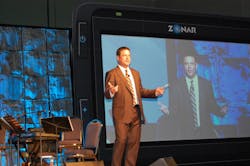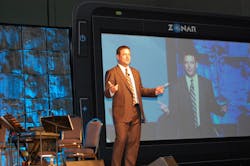Obviously, this being Zonar’s second annual user conference, the focus of Brinton’s remarks focused solely on the products and services his company is crafting for trucking. Interestingly, though, is that this “focus” is no longer just on the over-the-road freight hauling business or school bus fleets. Telematics is getting into the construction market to help improve asset management of concrete mixers, bulldozers, even road signs.
The “big thing” from Brinton’s perspective is how cloud-based technologies combined with “big data analytics” are going to give equipment operators of all stripes the chance to really take asset utilization and efficiency efforts to new levels.
“I think we’re finally going to realize the full promise of the Internet, in terms of it making our lives better and easier – not just more complicated,” he explained. “It’s about starting to really distill the operational information you generate on a daily basis to make your businesses even safer and more efficient than they already are.”
As an example, he pointed to the Detroit Connect system Zonar helped develop for the Detroit component subsidiary of Daimler Trucks North America (DTNA) – a system that combines multiple technologies to make the work life of truck drivers, dispatchers, and fleet managers that much easier, while at the same time providing valuable insight into ways to improve ongoing operations.
Perhaps the heart of the Detroit Connect system above is the use of a multi-purpose use of Zonar’s 2020 tablet computer – designed form the ground up to be, in Brinton’s words, a “platform for business systems the way a PC functions on an office desk.”
Now out in what Brinton described as a “second soft release,” the 2020 table handles everything from electronic logbooks to vehicle inspection reports, turn-by-turn directions, and two-way messaging with home base.
And it’s this type of technological “multi-tasking” through one single device that I think is what fleets really desire – they don’t want 15 different devices doing 15 different things in the truck cab. They want one unit to do it all.
Brinton stressed in his speech, though, that we’re really only now at the true beginning of how computers and related software systems will alter how trucking operates. The hope of course is that the industry’s experience with such “alteration” as it gets rolling will be a positive one.

